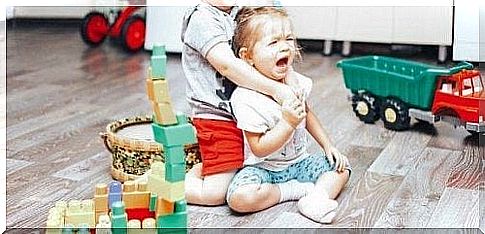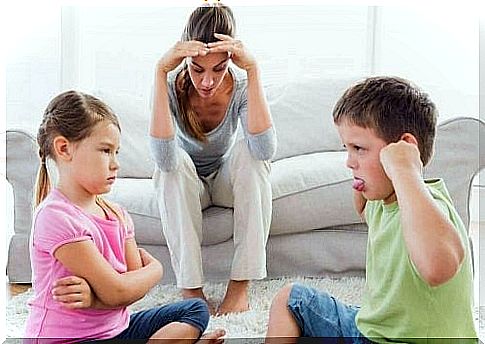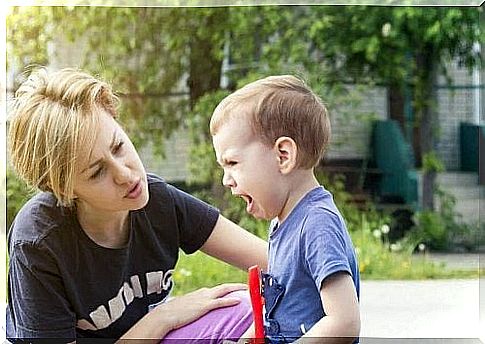How To Control Quarrels Between Children

We often witness quarrels between children, the feelings of anger being deeply human. Children usually start arguing at the age of two and continue to do so until late adolescence.
Children quarrel facing other children or because of the emotional situations in which the survival instincts enter the scene. They also quarrel with children younger than themselves to dominate them and impose their will.
The role of parents is very important in terms of quarrels between children. They need to teach their little ones what it means to respect and empathize with their peers, boundaries and, above all, how to control their impulses.
How to control quarrels between children
When young children quarrel with each other, they tend to bite, pull their hair, insult or punch. As they grow older, the physical attack becomes more elaborate and other children are teased. Adolescents can be very violent. During this period of their lives, young people tend to push the boundaries.
In the following, we will discuss six important tips to teach the little one to resolve conflicts in a civilized way.
1. Tell them about the power of words

You need to tell children about the power of words to the detriment of violence. They need to know that they must first try to resolve any misunderstanding through communication.
Children must try to act rationally and not resort to violence to solve problems. Of course, you don’t have to be violent with your child either if you want him to learn that violence is not the answer to everyday problems. Therefore, you should never punish your child with violence or aggression.
2. Be an example to your child
All people have moments when they lose control and force them to face those around them. But it is important to learn to control these moments of anger. Children are a reflection of the environment in which they grow up, so their reactions depend on the emotional education that is offered to them at home.
If you are an angry parent who attacks or insults others and throws things away, you cannot ask your child to be different. Your example will influence him more than the advice you give him. Children reproduce everything they see in their parents.
3. Encourage acts of wisdom and calm, not quarrels between children
As mentioned above , children learn to control their emotions at home. You need to teach them to act wisely when faced with a potentially conflicting or uncomfortable situation.
Remind your children that although we are part of the animal kingdom, we cannot rely solely on instincts and we cannot behave irrationally toward others. It is important to teach them to identify their emotions and keep them under control, especially when they are facing tense moments.
4. Remind them that the world does not revolve around them
Children should be aware that they are not always right and that the world does not revolve around them. Parents need to make their children understand that they are part of a group of human beings with different tastes and opinions and that everyone deserves respect.
Children need to understand that what they say or do will not always be a priority for others and that they should not react unpleasantly because of it. The respect he treats others will make them think twice before confronting other people aggressively.
5. Teach them to evaluate the consequences objectively
It is important to make children understand the consequences of their violent actions, such as rejection, hurting others, abuse, etc.
Children need to be aware of the consequences of being aggressive towards another person. No matter the age, quarrels between children are very common: teach them to realize how bad they can do through their behavior. In this way, they will progressively understand how to resolve a conflict situation.
6. Teach them that the solution is always communication

Although discussing communication between parents and children seems like a cliché, this is the best solution for the little ones to understand how to resolve conflicts peacefully.
Talk to your children, listen to them and ask them for details about how their day went. In this way, you will get to know them better and you will be able to guide them on the right path in resolving conflicts.
Your role as a parent is to guide your children

It is important to be aware of the importance of your actions in the child’s education. You are the one who has to impose limits, establish order and show respect. If you must punish your child, do it firmly, but without aggression.
Do not change your mind about punishments and do not show indulgence if the little ones are constantly creating problems with those around them. If you are flexible in cases of physical or verbal violence, your children will find it acceptable to use it.
Children and adolescents have their own dynamics. Quarrels between children and even between siblings are common. It is our duty as parents to show them the right way to solve problems according to their age.
Trust your instincts and teach your children to manage their emotions and impulses correctly. In this way, they will develop empathy and become rational and healthy adults.









